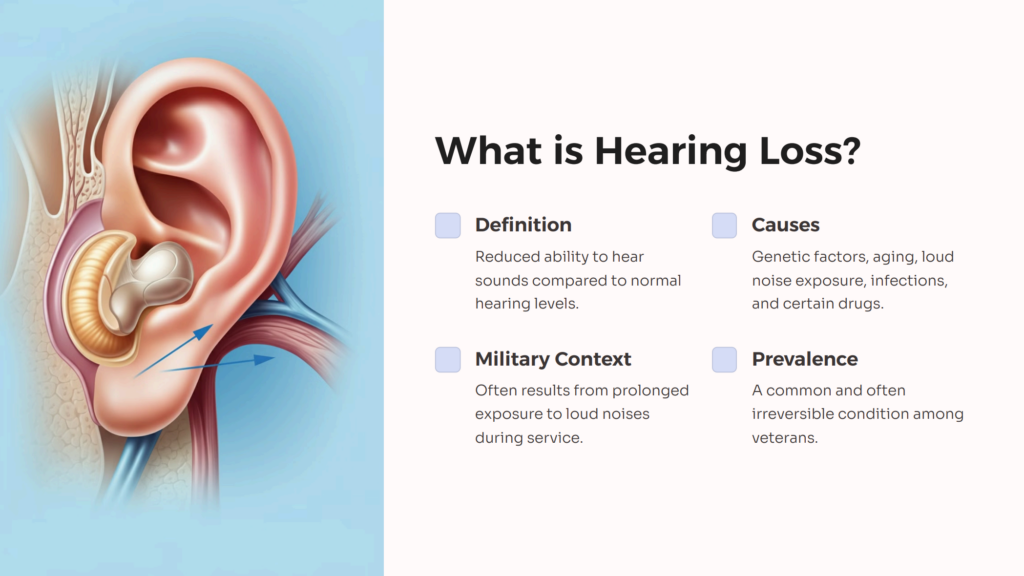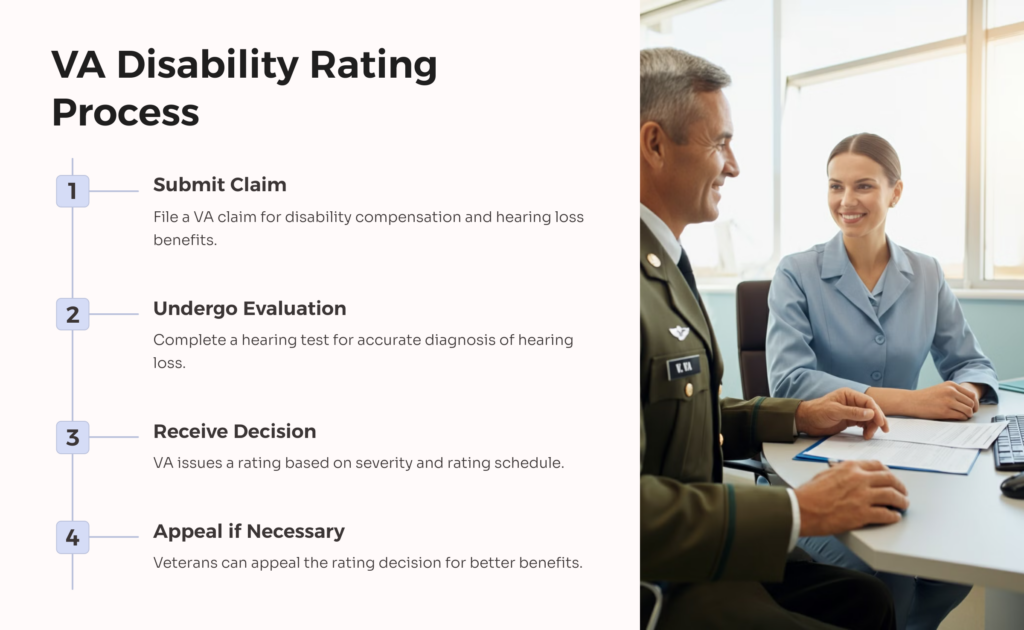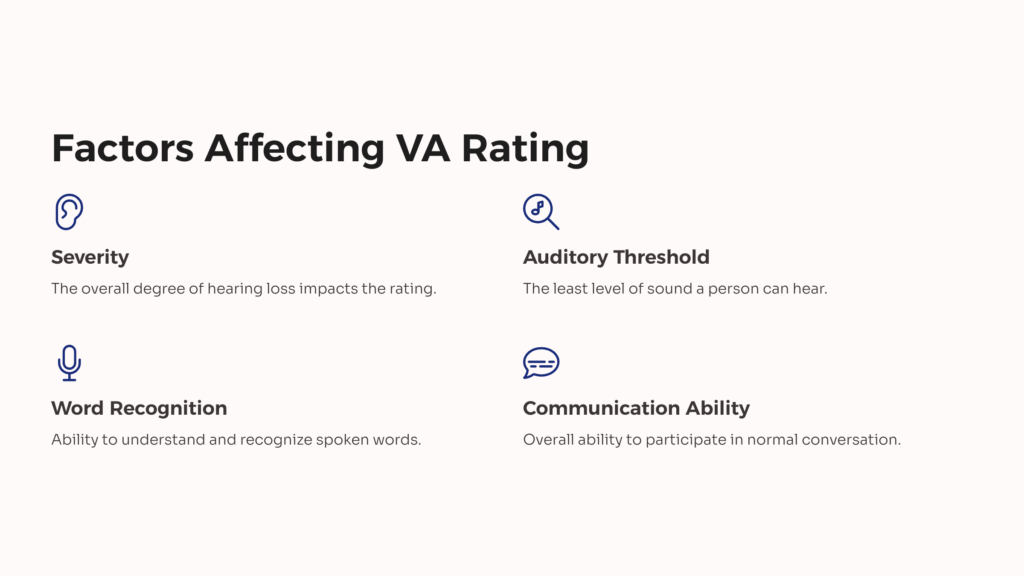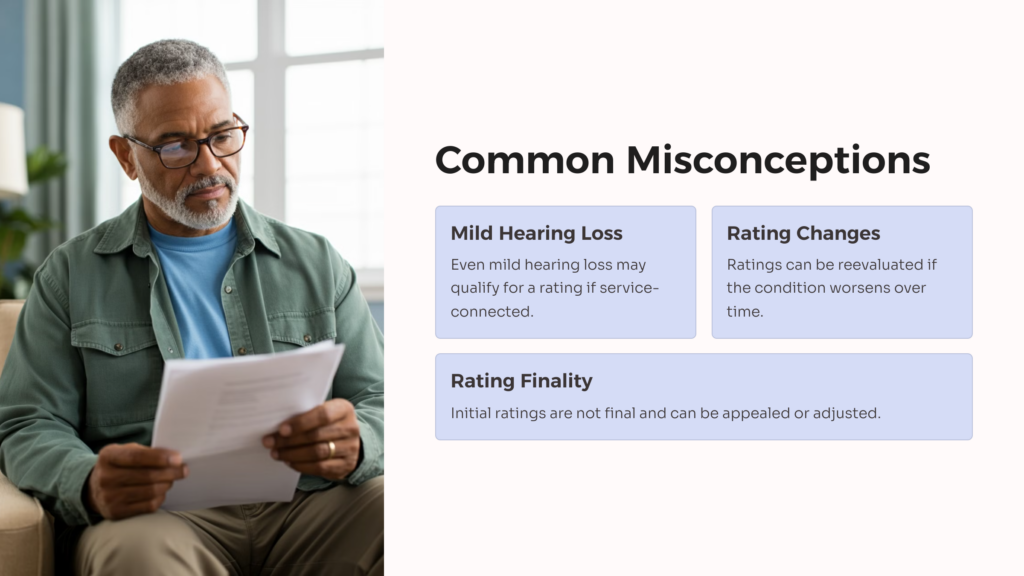The Veterans Affairs (VA) rating system serves to evaluate the severity of a veteran’s disability, determining the amount of compensation they deserve. Among all disability evaluations, a VA disability rating for hearing loss holds a significant place. Veterans frequently experience hearing loss due to a wide array of factors, and it’s the VA’s responsibility to ensure they receive VA disability compensation for this hearing impairment.
Understanding Hearing Loss

Hearing loss refers to a reduced ability to hear sounds in the same way as those with normal hearing levels. This impairment can result from genetic factors, aging, loud noise exposure, certain infections, birth complications, and drugs that are toxic to the auditory system. For veterans, hearing loss often occurs due to prolonged exposure to loud noise during military service, ranging from gunfire to vehicular sounds. This prevalent and often irreversible condition among veterans underscores the importance of the VA disability rating system in relation to hearing loss VA disability benefits.
VA Disability Rating Process for Hearing Loss

Applying for a VA rating for hearing loss involves several stages. After submitting a VA claim for disability compensation and hearing loss benefits, the veteran must undergo a hearing test for an accurate diagnosis of their hearing loss. Following this evaluation, the VA issues a rating decision based on the severity of the veteran’s hearing loss and the VA Schedule for Rating Disabilities. Should the veteran disagree with the initial determination of their VA disability claim, they have the right to appeal the rating decision for better VA benefits.
Moreover, to secure a rating and VA disability benefits, the veteran must provide the VA with proof of in-service noise exposure and that the hearing loss is indeed connected to their period of service. Thus, medical records and other related documents play a critical part in this process.
Factors Affecting Hearing Loss VA Rating

The VA considers multiple factors when deciding on the rating for a veteran’s hearing loss. These include the severity of the hearing loss, the veteran’s auditory threshold (the least level of sound that a person can hear), word recognition ability, as well as their overall ability to participate in normal communication.
To adequately determine the rating of a veteran’s hearing loss, the VA employs an elaborate methodology, which features an audiometric test to quantify the veteran’s degree of hearing loss. This approach helps to create a fair and objective rating decision for every veteran.
Degrees of Hearing Loss and Corresponding VA Ratings
Hearing loss falls into four categories: slight, moderate, severe, and profound. Each degree of hearing loss corresponds to different VA ratings under the VA Schedule for Rating Disabilities. For instance, moderate hearing loss may result in a 10% rating, while severe-to-profound hearing loss may lead to a 30% or 50% rating, depending on other factors like speech discrimination, conversational difficulty, and bilateral hearing impairment.
Consequences of VA Ratings for Veterans
The VA ratings have substantial implications for veterans. These ratings dictate the VA benefits and disability compensation a veteran receives, as well as access to resources for coping with hearing loss. For instance, a high rating can provide access to hearing aid benefits and coverage of treatments or therapies to standardize their hearing condition and improve their quality of life.
Misconceptions and Confusions about VA Ratings for Hearing Loss

Among veterans, misconceptions and confusing aspects abound regarding hearing loss VA ratings. Common misconceptions include the belief that mild hearing loss cannot get a rating and that once you have a rating, it can’t be changed. It’s crucial to remember that even mild hearing loss may qualify for a disability rating if it’s service-connected. And, if the condition worsens over time, veterans may seek a reevaluation for an increased rating.
Applying for a VA Rating for Hearing Loss
Veterans looking to apply for a hearing loss VA rating must follow a step-by-step process. This begins with gathering necessary documents such as medical records, service records, and audiological evaluations. Then, they must submit a VA compensation claim through the VA’s online portal or mailing system. Next, they attend a Compensation & Pension (C&P) exam for an assessment of their hearing loss. Lastly, they will receive the VA’s rating decision on their disability rating and the amount of VA disability compensation they can receive.
We encourage all veterans grappling with hearing loss to leverage the help and resources at their disposal to achieve the support they deserve. Let us help you at AllVeteran.com! Start today by taking our free medical evidence screening.
 AllVeteran.com Advisors
AllVeteran.com Advisors
With expertise spanning local, state, and federal benefit programs, our team is dedicated to guiding individuals towards the perfect program tailored to their unique circumstances.


















